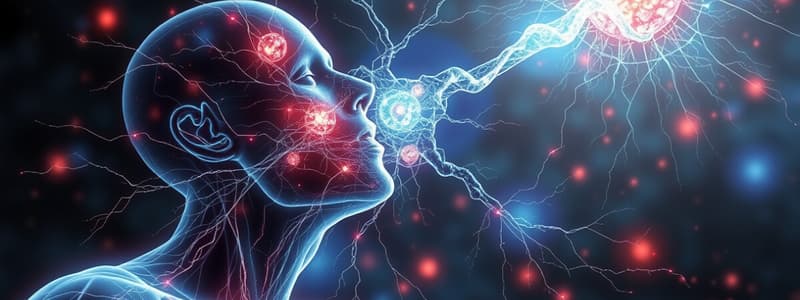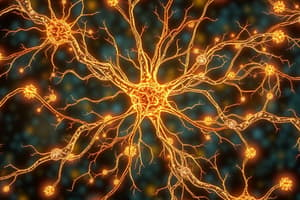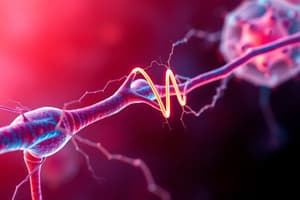Podcast
Questions and Answers
What is the primary function of thyroxine produced by the thyroid gland?
What is the primary function of thyroxine produced by the thyroid gland?
- Stimulates the production of sperm
- Regulates, stimulates, and maintains metabolism and homeostasis (correct)
- Controls contraction of the uterus
- Regulates blood sugar levels
Which of the following correctly contrasts nerve action and hormone action?
Which of the following correctly contrasts nerve action and hormone action?
- Hormone action is electrical and slow-acting
- Nerve action is electrical and short-lived (correct)
- Nerve action is chemical and widespread
- Hormone action is fast-acting and precise
What is the function of insulin produced by the pancreas?
What is the function of insulin produced by the pancreas?
- Changes the Graafian follicle into the corpus luteum
- Stimulates milk production
- Regulates blood sugar levels (correct)
- Promotes maturation of T and B-cells
Which hormone is responsible for stimulating the development of the Graafian follicle in females?
Which hormone is responsible for stimulating the development of the Graafian follicle in females?
Which statement about the actions of hormones is correct?
Which statement about the actions of hormones is correct?
What is the primary function of exocrine glands?
What is the primary function of exocrine glands?
Which exocrine gland produces bile, a substance critical for digestion?
Which exocrine gland produces bile, a substance critical for digestion?
What type of gland releases insulin directly into the bloodstream?
What type of gland releases insulin directly into the bloodstream?
How do hormones primarily affect target cells in the body?
How do hormones primarily affect target cells in the body?
Which gland is known as the 'master gland' of the endocrine system?
Which gland is known as the 'master gland' of the endocrine system?
What is the role of the pancreas as an exocrine gland?
What is the role of the pancreas as an exocrine gland?
In terms of hormonal regulation, what is the function of the thyroid hormone?
In terms of hormonal regulation, what is the function of the thyroid hormone?
What effect does nervous stimulation have on endocrine glands?
What effect does nervous stimulation have on endocrine glands?
Which of the following is primarily affected in diabetes due to insulin dysfunction?
Which of the following is primarily affected in diabetes due to insulin dysfunction?
What role does the adrenal gland play in hormone secretion?
What role does the adrenal gland play in hormone secretion?
Flashcards are hidden until you start studying
Study Notes
Comparison of Nerve Action and Hormone Action
- Nerve action is fast-acting, whereas hormone action is slow-acting.
- Nerve signals are electrical, while hormones are chemical messengers.
- Nerve responses are short-lived, in contrast to the long-lasting effects of hormones.
- Nerve action is precise targeting specific cells, while hormonal action is widespread affecting various tissues.
Functions of the Endocrine System
- Maintains homeostasis by regulating body processes.
- Mediates responses to external stimuli.
- Regulates reproduction, growth, and development.
Pituitary Gland
- Located at the base of the brain, beneath the hypothalamus.
- Produces hormones such as:
- Follicle-stimulating hormone (FSH): Stimulates oocyte development in females and sperm production in males.
- Luteinising hormone (LH): Converts Graafian follicle into corpus luteum post-ovulation.
- Oxytocin: Initiates milk release during suckling and uterine contractions.
- Prolactin: Promotes milk production.
Hypothalamus
- Situated above the pituitary gland.
- Secretes Growth hormone-releasing hormone (GHRH) to stimulate growth hormone release from the pituitary.
Thyroid Gland
- Butterfly-shaped and located in front of the trachea.
- Produces thyroxine, crucial for regulating metabolism and maintaining homeostasis.
Thymus
- Positioned behind the breastbone.
- Produces thymosin, which aids in T and B cell maturation for the immune response.
Pancreas
- Located adjacent to the liver.
- Functions as both an endocrine and exocrine gland.
- Endocrine role: Produces insulin to regulate blood sugar levels.
- Exocrine role: Produces digestive enzymes like lipase and amylase released via the pancreatic duct.
Adrenal Glands
- Found atop each kidney.
- Produce adrenaline, which redistributes blood to muscles during stress and emergencies.
Ovaries
- Female reproductive organs located on either side of the uterus.
- Produce hormones such as oestrogen and progesterone for regulating reproductive functions.
Exocrine Glands
- Export products through ducts.
- Examples include:
- Tear Glands: Produce antibacterial enzymes in tears.
- Sweat Glands: Release sweat to cool the body.
- Salivary Glands: Produce saliva containing amylase for digestion.
- Kidneys: Excrete water, urea, and salts.
- Liver: Produces bile for digestion.
- Mammary Glands: Produce milk under oestrogen influence, especially during puberty.
Hormonal Action and Diabetes
- Insulin, produced by beta cells in the pancreas, is critical for blood sugar regulation.
- Type 1 Diabetes: Autoimmune destruction of insulin-producing beta cells.
- Type 2 Diabetes: Insulin resistance in body cells leading to insufficient insulin production over time.
- Insulin Regulation:
- Low insulin levels result in high blood sugar, causing symptoms such as thirst and fatigue.
- Excess insulin can drastically lower blood sugar levels, risking unconsciousness or death.
- Treatments:
- Type 1: Requires insulin injections.
- Type 2: Managed through diet, medication, and potentially insulin injections when necessary.
Feedback Mechanism
- Hormonal levels are regulated via feedback mechanisms maintaining balance.
- Thyroid activity, for instance, is controlled by thyroid-stimulating hormone from the pituitary gland, responding to detected changes in hormone levels.
Studying That Suits You
Use AI to generate personalized quizzes and flashcards to suit your learning preferences.




